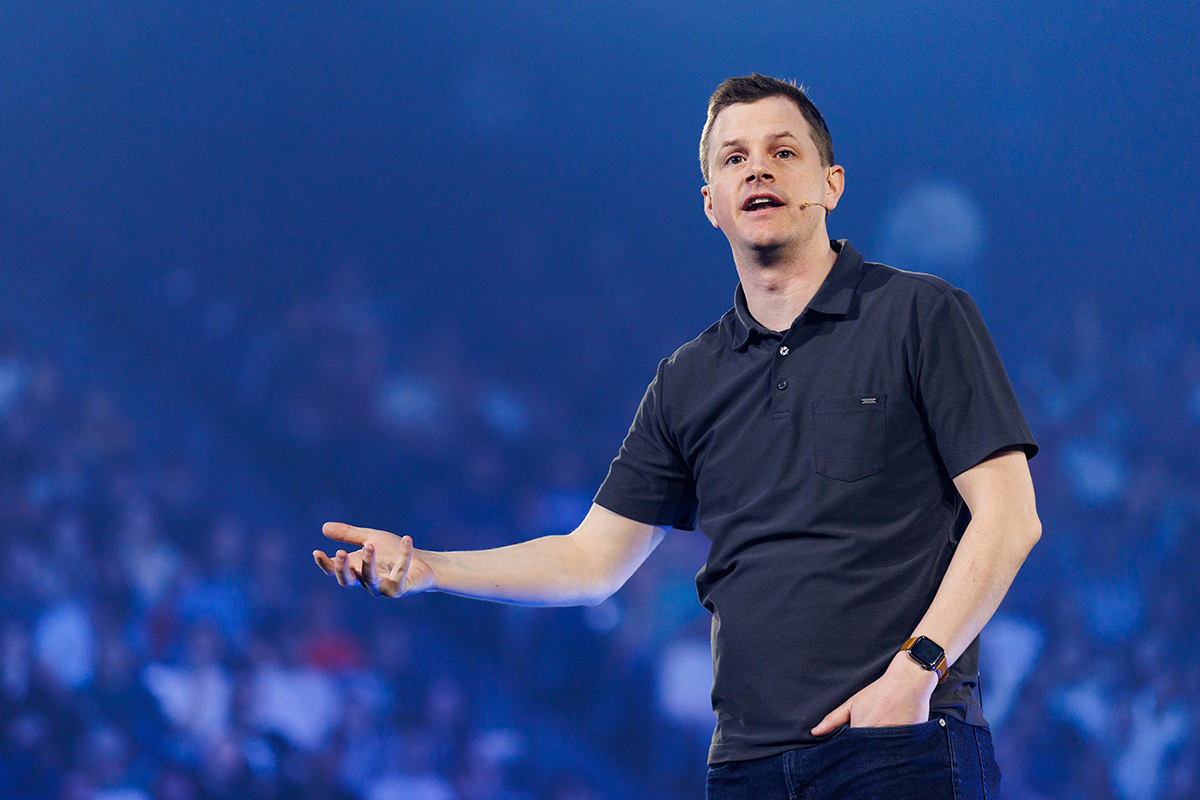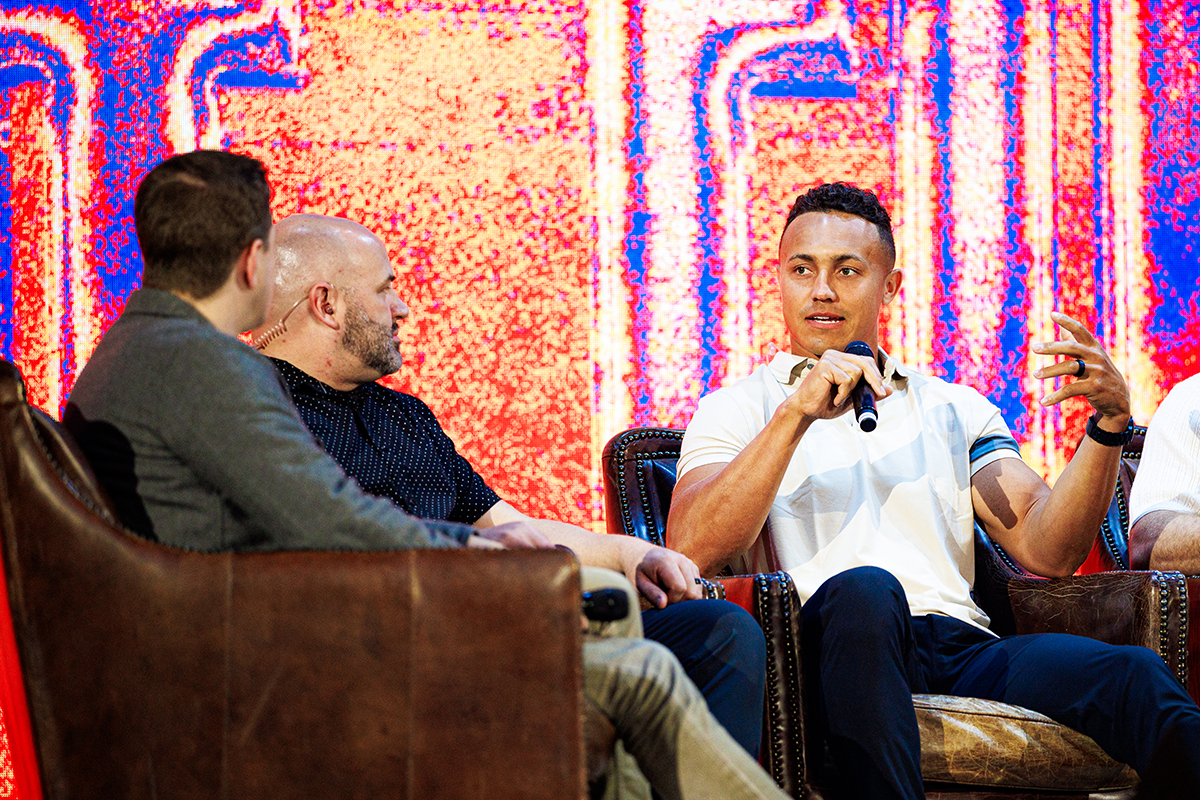Search News Archives
Filter News Articles
Additional Navigation
Hope Heals founder Katherine Wolf teaches students to turn stories of hardship into purpose, joy
November 13, 2024 : By Ryan Klinker - Office of Communications & Public Engagement
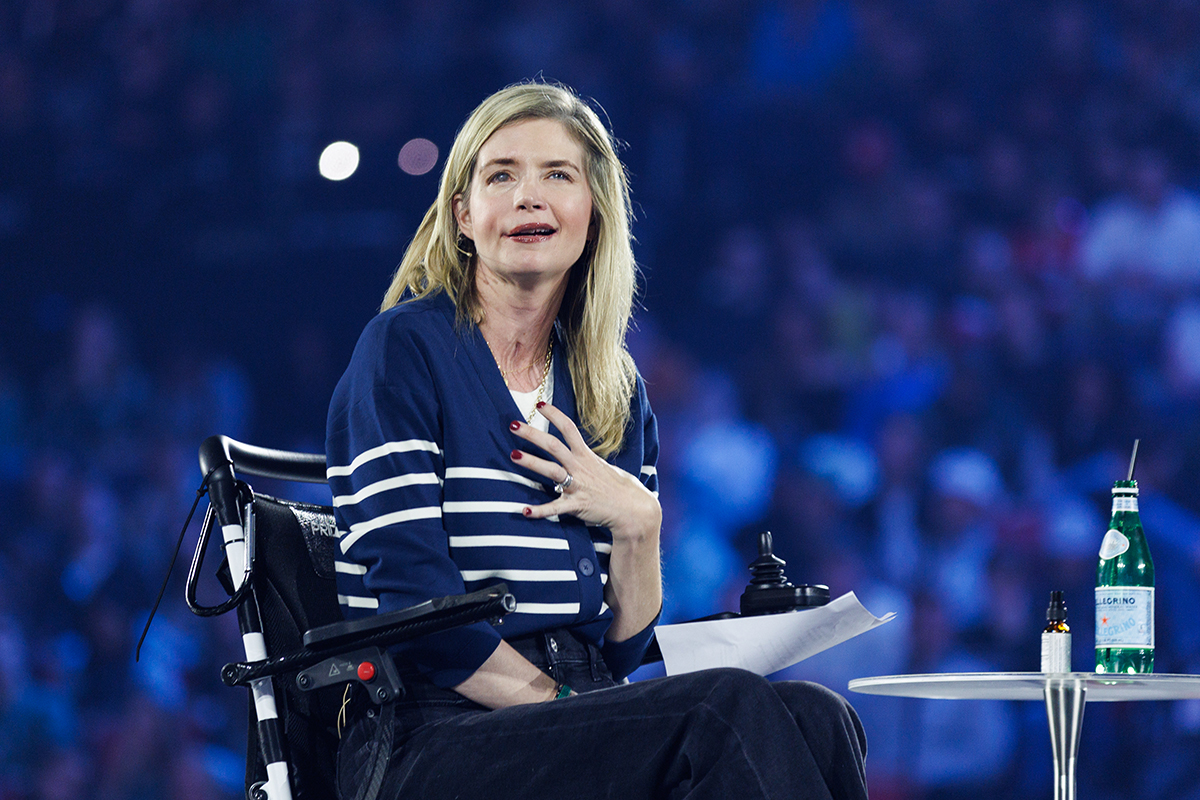
In sharing her life story, author and Hope Heals founder Katherine Wolf used Wednesday morning’s Convocation to embolden Liberty University students to find the treasures of joy within the darkness, seek the purpose of the lives God is giving them, and to share their own stories that inspire others to do the same.
Wednesday was Wolf’s fourth time speaking in Convocation, following appearances in 2018, 2020, and 2022.
Prior to Wolf’s message, Convocation opened with a time of recognition and honor for those in the United States military. Maj. Gen. Jason Bohm, U.S. Marine Corps (Ret.), dean of Liberty’s Helms School of Government, spoke to the spirit of Veterans Day and Military Appreciation Month at Liberty and led the crowd in recognizing the veterans and military family members in attendance. Student veterans received special seating in the President’s Box. Bohm also led the traditional Marine Corps cake-cutting ceremony to celebrate the branch’s 249th birthday.
“It is right, fitting, and important this morning that we pause and reflect on Jesus’ service, His service, and His love for us,” Bohm said. “I love that we can never give back, yet we all strive every day to serve Him in our own unique ways. This morning, we want to recognize those who have chosen to wear the cloth of our great nation, those young men and women who willingly volunteered to step forward and be counted, to serve and sacrifice for the greater good, for the idea that all men and women are created equal under the eyes of God.”
Sitting center stage in her wheelchair, Wolf began by saying she hopes her message would stir change in the minds and lives of those listening and make them feel comfortable sharing their own.
“When your life blows up, you need a lot more than inspiration, I believe,” she said. “The reality is I want us to move. I believe the Lord left me on this earth to proclaim that we must move from merely inspiration to application to you and your story. … I think we need to move from inspiration to identification. In sharing with lots of empathetic listeners through a whole lot of years, I’m changing my brain. Start sharing your story and see what happens to your head and your heart.”
She proposed the idea that every person is in a ‘wheelchair,’ a daily burden of the mind and soul caused by past hardships.
“I believe we all are actually living a story of disability; we just don’t all have eyes to see it. … I believe some of us are in physical wheelchairs, as I am, but all of us are in internal, invisible wheelchairs. We all have stuff in our stories that is not OK: hard things we’ve been through, haunting memories, sadnesses, struggles, sin. So much has hurt us. We have all been hurt by life.”
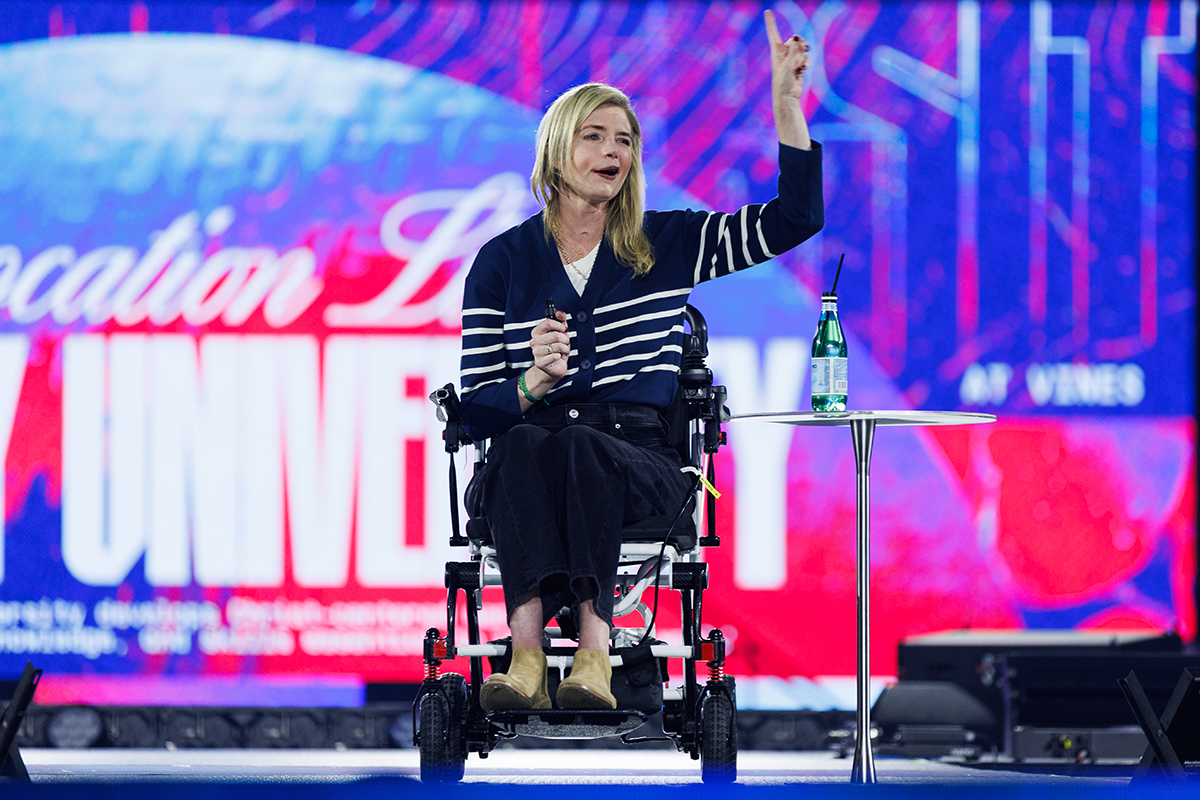
At the age of 25, Katherine Wolf was married to her college sweetheart and raising a 6-month-old son when a massive brain stem stroke left her life in jeopardy. She had to relearn to live physically, mentally, and spiritually, and she once questioned why God had let her continue to live despite the debilitating state of her body.
“I’m living an awesome life, and the 35-year-old version of Katherine is better than the 25-year-old version of Katherine,” she said, showing an Instagram post with photos of herself at both ages. “I can hardly tell you all of that hard stuff without also telling you that there have been amazing things. There has been horrible collateral damage in my story, but there have also been dramatic collateral gifts in the darkness.”
She quoted Isaiah 45:3, which says, “I will give you hidden treasures in the darkness, riches stored in secret places, so that you may know that I am the God of Israel, who calls you by name.” Wolf said these treasures are lessons that become directions to living the life God calls us to.
“I deeply love the notion that, if you have to go into the darkness, you might as well get the treasure while you’re there,” she said. “You might as well learn the right lessons from what you’re going through and let it inform the rest of your life. Don’t waste what God is doing in the darkness of your story.”
Wolf told the students that they have a greater capacity for hardship than they may think, calling them “antifragile” despite the fragility that the world may label them with, and noting that their strength comes from the Lord.
“You can stay and sit with very hard things and endure and persevere because of Jesus in your story,” she said. “When you know Jesus, it’s a different deal; it’s a game changer. You can endure and stay and cultivate that capacity (for hardship) because of the truth of 1 John 4:4 that ‘greater is He in me than he who is in the world.’ Philippians 4:19 says that ‘He will supply all of your needs in the moment you most need it.’”
Secondly, she stated the notion that “if you have a pulse, you have a purpose.” While her body isn’t as functional as it once was, Wolf acknowledges that she is alive because God has tasked her with actively carrying out His mission for her life.
“Even if my body doesn’t fully work anymore, I’m still on this earth, I still have breath in my lungs,” she said. “If you are on planet Earth right now — in (the Vines Center) or watching online, you are meant to be here in the story (of God). Your life has been assigned to you, it is a calling to live out your days as best you can, honoring Jesus, who has given them to you.”
What Wolf once dreamed of doing as a child is not the same today, and she shared the truth that everyone can dream new dreams.
“I never imagined (the stroke and what has followed) would happen to me. Yet the key to perseverance is being able to pivot into a new story. I call it being able to cultivate emotional agility. Those dreams from when we were little kids may not happen. But guess what? You get to dream new dreams. You get to wake up to what God is doing in your life.”
Stating that no one can dictate how someone feels about his or her own story, Wolf showed a recent photo of her with her husband, Jay, and their two sons. She said one could view the photo as sad, as she is visibly not how she once was, or as a celebration — seeing the husband who stayed at her side through her journey, her oldest son’s happiness, her youngest son who was miraculously born more than seven years after her stroke, and herself with a life still to live.
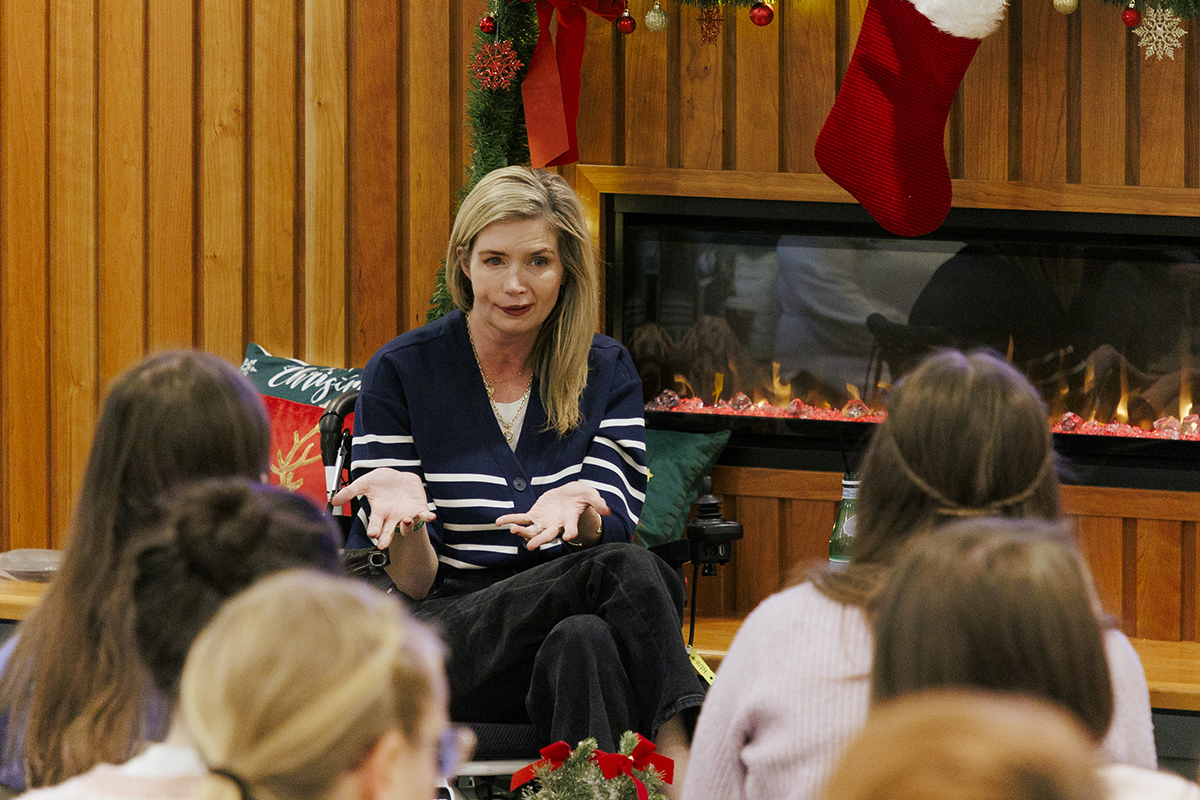
“You are more than just the worst or best thing that has happened to you. Even if the world says that I should hate my story, I can choose to love my story,” she said. “There is so much in this world we cannot control, if we’re honest, but guess what we have ultimate control over? How we feel about it. The question is: how are you going to see your life? What lens are you putting up to the world?”
On Wednesday afternoon, Wolf met with students from the Office of Disability Accommodation Support (ODAS) and answered questions that centered on living with a disability. She spoke about the continued hope Christians have despite obstacles, overcoming the anger and questions of “What if?” and “Why?” that come with disability, and more. In response to a question about how she would respond to people who view her “as a prayer request,” she said when someone offers to pray for her physical healing, she often tells them that is not her priority.
“I tell them that they can pray for that, but I also say, ‘Pray for my children, pray for my marriage, pray for the way I live out my days on earth. I have so much more to do that doesn’t have to do with my physical body. Pray for my soul and the things that really matter. I’m a soul that has a body, not a body that has a soul.”
“It means the world to us that Katherine would take the time out of her schedule to speak to our students and answer some really important questions that are affecting our students’ lives,” said ODAS Senior Executive Director Ester Warren. “From a perspective of her walking a path of disability that a lot of our students here are walking, having that connection with her and receiving encouragement from her is very impactful. The way she offers messages of hope and true healing is tremendous.”
